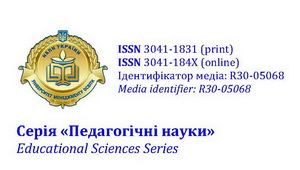The influence of the socio-cultural environment on family upbringing in Azerbaijan at the end of the 19th and beginning of the 20th centuries
Анотація
Ключові слова
Повний текст:
PDF (English)Посилання
REFERENCES / СПИСОК ВИКОРИСТАНИХ ДЖЕРЕЛ
A. N. Abbasov, Ailə pedaqogikası. Bakı, Azərbaycan : Nurlan, 2019.
Ə. Ağayev, Pedaqoji fikrimiz: dünənimiz, bu günümüz. Bakı, Azərbaycan : Elm, 2000.
S. H. Axundov, Ailədə uşaqların əxlaq tərbiyəsi. Bakı, Azərbaycan : Maarif, 1991.
O. Bayramlı, Füyüzat (1906-1907). Bakı, Azərbaycan : Çaşıoğlu, 2006.
Ş. Əfəndizadə, Seçilmiş əsərləri (1903-1925). Bakı, Azərbaycan : Elm və təhsil, 2017.
Ə. Ə. Əlizadə, A. N. Abbasov, Ailə həyatının etika və psixologiyası üzrə müntəxəbat. Bakı, Azərbaycan : Maarif, 1989.
Ə. İ. İsmayılxanova, Ailə dəyərləri. Bakı, Azərbaycan : ADPU, 2023.
Q. Q. Qeybullayev, Azərbaycanlılarda ailə və nikah (XIX əsr və XX əsrin əvvəlləri). Bakı, Azərbaycan : Elm, 1994, I hissə.
K. A. Məmmədov, Türk xalqlarının pedaqoji fikir tarixindən nümunələr. Bakı, Azərbaycan : Mütərcim, 2017.
M. R. Nuriyeva, «Şagird və valideynlərlə pedaqoji işin bəzi xüsusiyytətləri», Azərbaycan məktəbi, № 5, s. 48–52, 2014.
M. Cəlal, F. Hüseynov, XX əsr Azərbaycan ədəbiyyatı. Bakı, Azərbaycan : Maarif, 1982.
T. Əhmədov, Nəriman Nərimanov (Görkəmli ictimai-siyasi xadim, böyük ədib N.Nərimanovun anadan olmasının 140 illiyinə həsr olunur). Bakı, Azərbaycan : Nurlar, 2010.
H. M. Əhmədov, XIX əsr Azərbaycan məktəbi. Bakı, Azərbaycan : Təhsil, 2006.
T. Həsənzadə, Əkinçi, 1875-1877. Bakı, Azərbaycan : Avrasiya Press, 2005.
Ə. C. Tağıyev, Azərbaycan məktəb tarixi (XIX əsrin sonu XX əsrin əvəllərində). Bakı, Azərbaycan : Maarif, 1993.
TRANSLATED AND TRANSLITERATED / ПЕРЕКЛАД, ТРАНСЛІТЕРАЦІЯ
A. N. Abbasov, Family pedagogy. Baku, Azerbaijan : Nurlan, 2019. (in Azerbaijani).
А. Agayev, Our pedagogical idea: our yesterday, today. Baku, Azerbaijan : Elm, 2000. (in Azerbaijani).
S. H. Akhundov, Moral education of children in the family. Baku, Azerbaijan : Maarif, 1991. (in Azerbaijani).
O. Bayramli, Fuyuzat (1906-1907). Baku, Azerbaijan : Chasioglu, 2006. (in Azerbaijani).
Sh. Efendizadeh, Selected works (1903-1925). Baku, Azerbaijan : Science and education, 2017. (in Azerbaijani).
А. А. Alizadeh, A. N. Abbasov, Review on ethics and psychology of family life. Baku, Azerbaijan : Maarif, 1989. (in Azerbaijani).
А. І. Ismayilkhanova, Family values. Baku, Azerbaijan : ADPU, 2023. (in Azerbaijani).
G. Q. Geibullayev, Family and marriage among Azerbaijanis (19th century and beginning of 20th century). Baku, Azerbaijan : Elm, 1994, Part I. (in Azerbaijani).
K. A. Mammadov, Examples from the history of pedagogical ideas of the Turkic peoples. Baku, Azerbaijan : Mütərcim, 2017. (in Azerbaijani).
M. R. Nuriyeva, «Some features of pedagogical work with students and parents», Azerbaijan school, № 5, pp. 48–52, 2014. (in Azerbaijani).
M. Jalal, F. Huseynov, 20th century Azerbaijani literature. Baku, Azerbaijan : Maarif, 1982. (in Azerbaijani).
T. Ahmadov, Nariman Narimanov (Dedicated to the 140th anniversary of the birth of prominent social and political figure, great writer N. Narimanov). Baku, Azerbaijan : Nurlar, 2010. (in Azerbaijani).
H. M. Ahmadov, 19th century Azerbaijani school. Baku, Azerbaijan : Education, 2006. (in Azerbaijani).
T. Hasanzade, Akinchi, 1875-1877. Baku, Azerbaijan : Eurasia Press, 2005. (in Azerbaijani).
А. C. Taghiyev, School history of Azerbaijan (the end of the 19th century and the beginning of the 20th century). Baku, Azerbaijan : Maarif, 1993. (in Azerbaijani).
Посилання
- Поки немає зовнішніх посилань.
